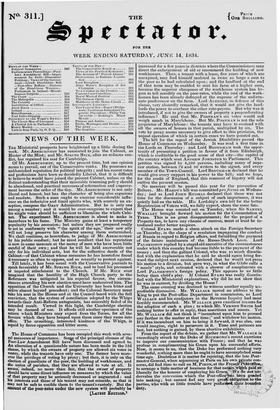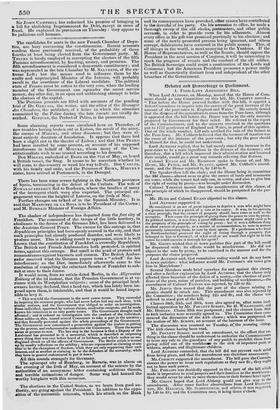The House of Commons has been occupied this week with
seve- ral measures of importance. Sore of the principal clauses of the Poor-Law Amendment Bill have been discussed and agreed to. An alteration of a questionable nature has been made in the 33d clause, by which the owners of property are allowed six votes in vestry, while the tenants have only one. The former have more- over the privilege of voting by proxy; but then, it is only on the election of guardians of the poor, the building of workhouses, and the union of parishes, that they are allowed to vote at all. It seems', indeed, no more than fair, that the owner of property should have some direct influence on measures by which the value of that property may be seriously decreased or augmented : and his interests and those of his tenant may not coincide, so that it may not be safe to confide them to the tenant's custody. But the amount of the poor-rates under the new system will probably be increased for a few years in districts where the Commissioners may direct the enlargement of' old or recommend the building of new workhouses. Thus, a tenant with a lease, five years of which are unexpired, may find himself mulcted in twice as large a sum to the poor as be had calculated upon ; and the landlord at the end of that term may be enabled to rent his farm at a higher sum, because the superior cheapness of the workhouse system has be- gun to tell sensibly on the poor-rates, while the cost of the work- houses has been already defrayed at the expense of the unfortu- nate predecessor on the farm. Lord ALTHORP, in defence of this clause, very absurdly remarked, that it would not give the land- lords the power to overbear the other rate-payers. But why was it introduced, if not to give the owners of property a preponderating influence ? He said that Mr. PORTMAN'S six votes would not weigh much in Marylebone. But Mr. PORTMAN is not the sole proprietor of Marylebone: the tenants may have to contend with all the owners of houses in that parish, multiplied by six. The vote by proxy seems necessary to give effect to this provision, the unjust operation of which in certain cases we have pointed out.
The bill for the repeal of the Jewish Disabilities passed the House of Commons on Wednesday. It was read a first time in the Lords on Thursday : and Lord BROUGHAM took the oppor- tunity of presenting a petition in favour of it from Edinburgh, which is creditable to the good sense of that city—the capital of the country which sent ANDREW JOHNSTON to Parliament. This petition was signed by 6,200 persons, including many of supe- rior station, between 70 and 80 writers to the signet, and every member of the Town-Council. Lord BROUGHAM declared that he would give every support in his power to the bill; and we hope, for the credit of England, that this remnant of bigotry will not outlive the present session. No measure will be passed this year for the prevention of Bribery. Mr. HARDY'S bill was committedpro forma on Wednes- day; and as Lord JOHN RUSSELL declared that there was not time for the discussion of a subject of such importance, it was quietly laid on the table. His Lordship's own bill for the better Registration of Voters will, we fully expect, share the same fate. The House was counted out on Tuesday, when Sir SAMUEL WHALLEY brought forward his motion for the Commutation of Taxes. This is no great disappointment; for the project of a Property-tax, to have any chance of success, must at least be in- troduced under better auspices. Colonel EVANS made a sham attack on the Foreign Secretary on Thursda)-, in the shape of a resolution impugning the conduct of Russia in regard to Belgian affairs, and forbidding the payment of the future instalments of the Russo-Dutch Loan. Lord PALMERSTON replied by a stupid old narrative of the circumstances under which this country had become liable to the payment of the money ; and then the gallant Colonel, who was so much dissatis- fied with the explanation that he said he should again bring for- ward the subject next session, declared that he would not press his motion to a division, but gave way, in what the Globe calls a "manly" style, and retreated with a shower of compliments on Lord PALMERSTON'S foreign policy. This appears to us little better than child's play. If Colonel EVANS was really dissatis- fied with the Ministerial explanations, why did he not show that he was in earnest, by dividing the House? The same evening was destined to witness another equally un- profitable discussion. Mr. WALLACE moved an address to the King to put the Post-office Department in commission, as Lord WALLACE and his coadjutors in the Revenue Inquiry had most forcibly recommended. Mr. WALLACE gave excellent reasons for the adoption of such a plan ; to which Mr. VERNON SMITH had nothing better to offer in reply, than assertions and sneers. Yet Mr. WALLACE did not think it "incumbent upon him to proceed any further in the matter at that timer and withdrew his motion. If it was incumbent on him to bring it forward, it was also, one would imagine, right to persevere in it. Time and patience are lost, but nothing is gained, by these abortive exhibitions. From the report of the debate, we gather that Mr. WALLACE is exceedingly struck by the Duke of RICHMOND'S recent exertions to improve our communication with France; and that he was profuse in complimenting his Grace upon his successful efforts. Now, it seems to us, that the Duke has performed nothing very wonderful, nothing more than he ought to have accomplished some time ago. Doubtless it is matter for rejoicing, that the late Post- master-General, when sojourning at Paris on his own pLivate con- cerns, did find time to call on M. PIRON, at the FrenclrPoit■office, to arrange a little matter of business for that flatten which paid so liberally for the honour of employing his Grace ,„'/We do not un- dervalue the concession which the Post-officOstis been goaded into making; but cannot feel any very gresinbligation to the parties, who with so little trouble have perforaW-their bounden duty,
• .
Sir JOHN CAMPBELL has redeemed his promise of bringing in a bill for abolishing Imprisonment for Debt, except in cases of fraud. He explained its provisions on Thursday : they appear to be judicious and humane.



















